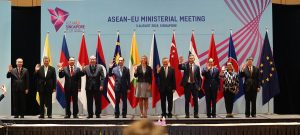Yesterday, the Reuters news agency reported that the European Union and the Association of Southeast Asian Nations (ASEAN) plan to hold their first full summit later this year, in a climate of growing strategic tensions in Asia. According to an EU official cited by Reuters, the summit, which is yet to be publicly announced, will be held in Brussels on December 14.
The planned summit indicates that the two blocs are looking to develop their strategic relationship amid the growing geopolitical polarization that has followed the Russian invasion of Ukraine.
The push factor from the European side is clear. According to EU officials cited by Reuters, the European bloc desires a more robust presence in the region, against a backdrop of growing concern about China and the increasing strategic tension between Beijing and Washington. One official said it was a sign of “increasingly close relations in the current geopolitical context.”
The reported EU summit, which Reuters was unable to confirm with any Southeast Asian governments, comes amid the Biden administration’s increased outreach to ASEAN, which culminated in President Joe Biden’s hosting of a U.S.-ASEAN Special Summit in Washington in May.
The Reuters report stated that security issues would be a key part of the discussions during the summit and that the EU would seek to clarify Southeast Asian nations’ stance on Russia’s invasion of Ukraine. Aside from Singapore, which has joined the international campaign of sanctions against Russia, most Southeast Asian governments have remained neutral on the war, viewing it as an essentially European conflict, despite being shaken by the economic reverberations of the war.
Even if they are unlikely to join the sanctions campaign, European diplomats will likely seek assurances from ASEAN partners that they will not help the Russian government circumvent Western sanctions.
For Southeast Asia, there are several good reasons to welcome a summit-level meeting with the EU. The first is the simple logic of diplomatic diversification. As one official who has been involved in talks with ASEAN governments told Reuters, “when it comes to hedging against the U.S.-China rivalry, the EU is always the very top answer in the region.”
The second is the clear economic benefit that the region stands to reap from closer relations with Brussels, which has shown itself willing and able to offer the trade and investment that for domestic political reasons is increasingly difficult for the United States. Two ASEAN nations have already agreed to free trade agreements with the EU – Singapore in 2019 and Vietnam in 2020 – and negotiations are ongoing between the EU and Malaysia, Thailand, the Philippines, and Indonesia.
The lack of such a robust economic pillar was one of the main shortcomings of the Indo-Pacific Economic Framework unveiled by the U.S. government earlier this year, which held out the prospect of signatories having to meet a range of benchmarks around labor rights and anti-corruption, without the lure of reduced tariffs or market access.
While the summit has yet to be confirmed or formally announced, the most pressing question is how far the perceptions and interests of the two sides overlap in a post-Ukraine world, and how much old areas of tension – including environmental and human rights issues – will impede fruitful interactions on other areas of mutual interest.

































